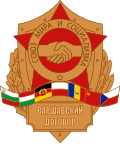
Back أحداث المتاريس Arabic Barrikadalar zamanı Azerbaijani Ригала 1991 йылдың ғинуар ваҡиғалары Bashkir Студзеньскія падзеі ў Рызе BE-X-OLD Les Barricades Catalan Barrikadetiden Danish Τα Οδοφράγματα Greek Barricadas de Letonia Spanish Ռիգայի դեպքեր (հունվար, 1991) Armenian ბარიკადები (ლატვია) Georgian
| The Barricades | |||||||
|---|---|---|---|---|---|---|---|
| Part of Revolutions of 1989, Singing Revolution and Dissolution of the Soviet Union | |||||||
 Barricade in Jēkaba Street, July 1991 | |||||||
| |||||||
| Belligerents | |||||||
| Commanders and leaders | |||||||
|
|
| ||||||
| Casualties and losses | |||||||
|
2 policemen killed 4 civilians killed 4 policemen wounded 10 civilians wounded[nb 1] | At least 1 OMON soldier killed[1] | ||||||
| |||||||
| Eastern Bloc |
|---|
 |
The Barricades (Latvian: Barikādes) were a series of confrontations between the Republic of Latvia and the Union of Soviet Socialist Republics in January 1991 which took place mainly in Riga. The events are named for the popular effort of building and protecting barricades from 13 January until about 27 January. Latvia, which had declared restoration of independence from the Soviet Union a year earlier, anticipated that the Soviet Union might attempt to regain control over the country by force.
After attacks by the Soviet OMON on Riga in early January, the government called on people to build barricades for protection of possible targets (mainly in the capital city of Riga and nearby Ulbroka, as well as Kuldīga and Liepāja). Six people were killed in further attacks, several were wounded in shootings or beaten by OMON. Most victims were shot during the Soviet attack on the Latvian Ministry of the Interior on January 20, while another person died in a building accident reinforcing the barricades. The exact number of casualties among the Soviet loyalists is unknown. Around 32,000 people have received Commemorative Medal for Participants of the Barricades of 1991 for the participation or support for the event.[2]
- ^ Mirlins 2016, p. 249
- ^ Zaltāns, Kaspars (March 8, 2016). "Latvia's Barricades of Freedom – What Do They Mean 25 Years On?". Deep Baltic. Retrieved February 6, 2018.